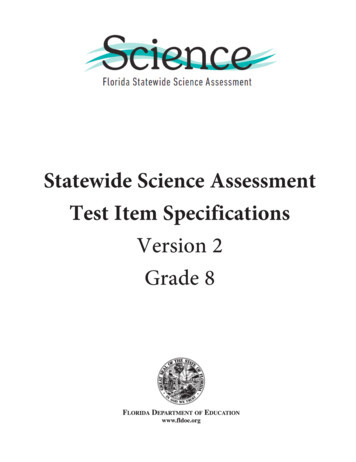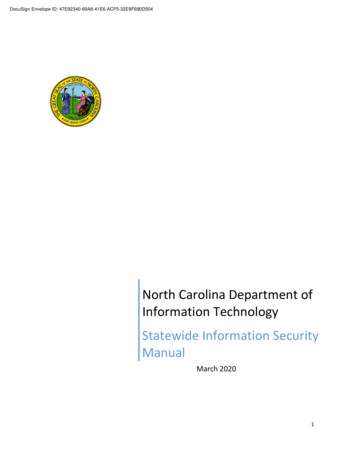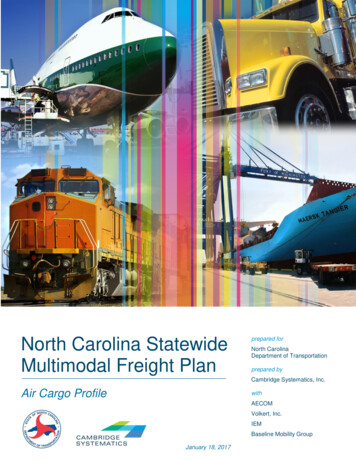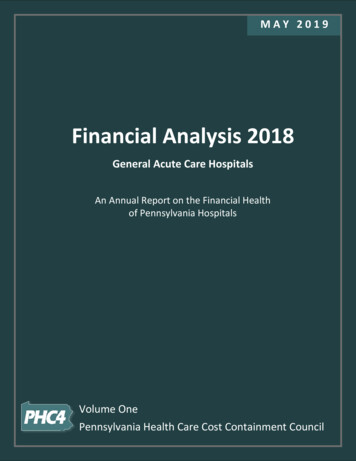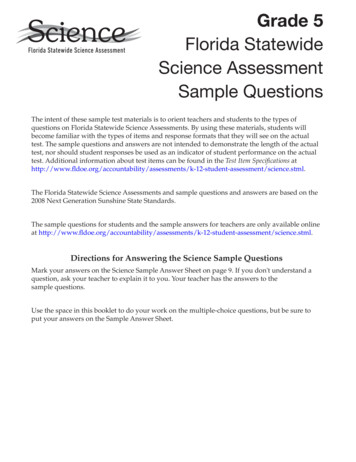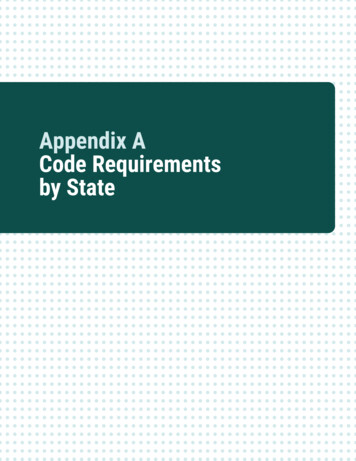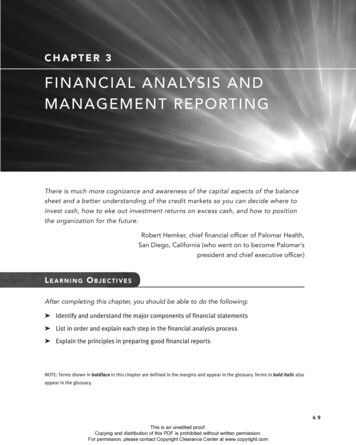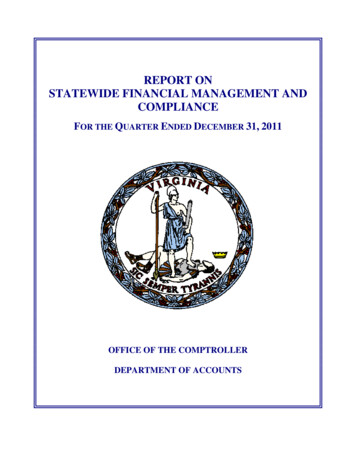
Transcription
REPORT ONSTATEWIDE FINANCIAL MANAGEMENT ANDCOMPLIANCEFOR THE QUARTER ENDED DECEMBER 31, 2011OFFICE OF THE COMPTROLLERDEPARTMENT OF ACCOUNTS
Prepared and Published byDepartment of AccountsCommonwealth of VirginiaP. O. Box 1971Richmond, VA 23218-1971Text and graphics were produced usingMicrosoft Word for Windows in Arialand Times New Roman fonts.
TABLE OF CONTENTSREPORT ON STATEWIDE FINANCIAL MANAGEMENTAND COMPLIANCEQuarter Ended December 31, 2011PageSTATEMENT OF PURPOSE . 3COMPLIANCE .Auditor of Public Accounts Reports - Executive Branch Agencies .Audit Reports – Quarter Ended December 31, 2011.Audit Findings – Quarter Ended December 31, 2011 .Additional Recommendations – Quarter Ended December 31, 2011 .Special Reports – Quarter Ended December 31, 2011 .Other Audit Reports Received – Quarter Ended December 31, 2011 .Summary of Prior Audit Findings .Status of Prior Audit Findings .Compliance Monitoring .Confirmation of Agency Reconciliation to CARS Reports .Response to Inquiries .Trial Balance Review .Analysis of Appropriation, Allotments and Expenditures and Cash Balances .Disbursement Processing .Paperwork Decentralization .Prompt Payment Compliance .E-Commerce .Financial Electronic Data Interchange (EDI).Travel EDI .Direct Deposit.Payroll Earnings Notices .Small Purchase Charge Card (SPCC) and Increased Limit (Gold) Card.Travel Charge Card.Payroll Controls .PMIS/CIPPS Payroll Audit.PMIS/CIPPS Exceptions .Payroll Certification .Health Care 44495255606262656668FINANCIAL MANAGEMENT ACTIVITY .Commonwealth Accounting and Reporting System (CARS) .Payroll .Accounts Receivable.Indirect Costs .Loans and Advances .69697173858712/31/11 Quarterly Report2Department of Accounts
STATEMENT OF PURPOSEThe Code of Virginia requires that the Department of Accounts (DOA) monitor and account for alltransactions involving public funds. In order to carry out this mandate, the Department uses avariety of measures, including automated controls, statistical analyses, pre-audits and post-audits,staff studies and reviews of reports issued by the Auditor of Public Accounts. When taken as awhole, these measures provide an important source of information on the degree of agencycompliance with Commonwealth accounting and financial management policies, internal controls,procedures, regulations, and best practices.The Comptroller’s Report on Statewide Financial Management and Compliance (the QuarterlyReport) is a summary of measures used by DOA to monitor transactions involving public funds andreport findings to the Governor, his Cabinet, and other senior State officials. The Quarterly Reportuses exception reporting and summary statistics to highlight key findings and trends. TheDepartment also provides additional detailed financial management statistics for agencies andinstitutions of higher education.This Quarterly Report includes information for the quarter ended December 31, 2011, andcomparative FY 2011 data. Some information in the report is for the quarter ended September 30,2011, which is the most current data available.David A. Von Moll, CPA, CGFMComptroller12/31/11 Quarterly Report3Department of Accounts
COMPLIANCEAuditor of Public Accounts Reports - Executive Branch AgenciesAgency audit reports issued by the Auditor of Public Accounts (APA) may contain findings becauseof noncompliance with state laws and regulations. Agencies may also have internal control findingsconsidered to be control deficiencies. Control deficiencies occur when the design or operation ofinternal control does not allow management or employees to prevent or detect errors that, in theAuditor’s judgment, could adversely affect the agency’s ability to record, process, summarize, andreport financial data consistent with the assertions of management.Each agency must provide a written response that includes a Corrective Action Workplan (CAW) to theDepartment of Planning and Budget, the Department of Accounts, and the agency’s Cabinet Secretarywhen its audit report contains one or more audit findings. Workplans must be submitted within 30 daysof receiving the audit report. Commonwealth Accounting Policies and Procedures (CAPP) manual,Topic No. 10205, Agency Response to APA Audit, contains instructions and guidance on preparing theworkplan.The APA also reports additional recommendations that can include risk alerts, efficiency issues, orany other improvements that can be made within agency operations. Risk alerts address issues thatare beyond the capacity of agency management to implement effective corrective actions.Efficiency issue report items provide management with recommendations to enhance agencypractices, processes or procedures. Additional recommendations are provided following the AuditFindings section.The APA also issued several Special and Other Reports during the quarter. These reports are listedfollowing the Additional Recommendations section. The full text of these reports is available atwww.apa.virginia.gov.Audit Reports – Quarter Ended December 31, 2011The APA issued 16 reports covering 31 State Agencies for the Executive Branch. The last columnindicates whether the CAW has been received as of the date of this publication for each agency withaudit findings. Note that in some cases, the CAW may not have been received because it is not yetdue.AdministrationNoneAgriculture and ForestryNoneCommerce and TradeDepartment of Mines, Minerals, and EnergyVirginia Economic Development PartnershipVirginia Employment CommissionVirginia Racing CommissionEducationOld Dominion University12/31/11 Quarterly ceived002100100031N/AN/AYESYES011YESDepartment of Accounts
University of VirginiaVirginia Polytechnic Institute and StateUniversityExecutive OfficesOffice of the GovernorOffice of the Lieutenant GovernorAttorney General and Department of Law (1)Division of Selected Agency Support Services (2)Citizens’ Advisory CouncilInterstate Organization ContributionsOffice of Substance Abuse PreventionSecretary of the CommonwealthVirginia-Israel Advisory BoardThe Governor’s Cabinet Secretaries (3)Secretary of AdministrationSecretary of Agriculture and ForestrySecretary of Commerce and TradeSecretary of EducationSecretary of FinanceSecretary of Health and Human ResourcesSecretary of Natural ResourcesSecretary of Public SafetySecretary of TechnologySecretary of TransportationSecretary of Veterans Affairs and HomelandSecurityFinanceNoneHealth and Human ResourcesVirginia Foundation for Healthy YouthNatural ResourcesNonePublic SafetyDepartment of Alcoholic Beverage ControlTechnologyInnovation and Entrepreneurship InvestmentAuthority (4)TransportationVirginia Port AuthorityVeterans Affairs and Homeland 00N/A213YES000N/A112YESThis report includes the Division of Debt Collection.One report covering five entities.One report covering 11 agencies.This report includes the Center for Innovative Technology, a Blended Component Unit.12/31/11 Quarterly Report5Department of Accounts
Audit Findings - Quarter Ended December 31, 2011The following agencies had one or more findings contained in their audit report.Commerce and TradeVirginia Employment Commission (VEC)1. Resolve Employer Wage Discrepancies Timely. The Tax Reconciliation Unit is notconsistently reviewing and resolving wage discrepancies in a timely manner. Employersreport wages paid to employees to the Employment Commission, which verifies the amountsreported against other sources of information such as tax returns. Differences between theamounts reported to the Employment Commission appear on various wage discrepancyreports and the Tax Reconciliation Unit reviews and resolves discrepancies that meet certainthresholds.During their review, the APA found the Tax Reconciliation Unit did not adequately resolvethree out of sixteen (19 percent) wage discrepancies tested in a timely manner. These wagediscrepancies date from January 2008, March 2010, and January 2011. While the TaxReconciliation Unit staff did identify these discrepancies and contact the employer, they didnot perform additional follow up and these discrepancies remain unresolved. In addition,the Tax Reconciliation Unit does not have consistent polices for what constitutes timelyresolution of identified discrepancies.During the APA’s review, they also requested a complete listing of wage discrepancies thatthe Tax Reconciliation Unit was currently working on and the Unit told the APA multipletimes they could not provide them with a complete listing. Tax Reconciliation staffsubsequently provided the APA with several listings, but the listings were incomplete anddid not include information on the discrepancy amount or age of the discrepancy. As aresult, the APA was unable to determine the total number of discrepancies or total dollaramount of discrepancies the Unit is currently researching.The APA recommends that the Tax Reconciliation Unit improve their review and resolutionprocess for wage discrepancies to ensure timely resolution of discrepancies over theestablished thresholds. The Unit should also ensure they have consistent policies on timelyresolution of the discrepancies as well as information necessary to track and monitor thestatus of discrepancies under review.2.Follow Timekeeping and Payroll Procedures. Employment Commission staff need toconsistently follow policies and procedures over timekeeping and payroll. To address anincreased workload over the last several years, the Employment Commission has hiredadditional personnel and required overtime for many staff. As a result, it is critical that theEmployment Commission staff follow policies and procedures over timekeeping andpayroll; the APA found the following instances where staff did not follow these policies andprocedures. Supervisors are not consistently obtaining advance approval for overtime. TheEmployment Commission’s policies require an employee’s supervisor obtain advance12/31/11 Quarterly Report6Department of Accounts
approval from the Division head for overtime including the specific dates and hours ofovertime.The APA reviewed overtime records for a sample of fourteen employees and found that11 of the employees had instances during the year where their Supervisor did not getapproval in advance for the overtime. Although overtime worked was subsequentlyapproved, seven of the employees worked more overtime hours than approved. Supervisors did not obtain approval for two out of 18 (11 percent) part-time employeestested who worked over 1,500 hours. Employment Commission and Commonwealthpolicies require supervisors request advance approval for part time workers who workmore than 1,500 hours in a year. In one case, the supervisor subsequently obtainedapproval for the employee.In the other case, the supervisor did not get approval for the additional hours worked, butthe employee continued to work unpaid. The employee worked 546 hours from July toOctober 2010, but the Employment Commission did not pay her for these hours and shedid not record these hours on her timesheet. When the supervisor retired, the employeebrought this to the attention of the new supervisor and the Employment Commissionpaid the employee for all hours worked.The Employment Commission also needs to improve access controls to TimeKeepers, theirinternal payroll and timesheet processing system. The APA found three employees withtimesheet approval access for TimeKeepers, but there was no documentation authorizingthese individuals to have approval access. These individuals noted did not approve anytimesheets during the audit period and the Employment Commission deleted access for twoof these individuals after the APA brought this to their attention. Additionally, there is noperiodic management review of TimeKeepers access even though this is a critical system tothe Employment Commission’s payroll process.The APA recommends that the Employment Commission strengthen policies andprocedures over TimeKeepers system access to help ensure only authorized individuals canaccess the system. When employees have access they do not need to complete their jobduties, this increases the risk that fraudulent activities could occur. EmploymentCommission management should also ensure policies and procedures over approval forovertime and part time employees are followed. More effective overtime controls willminimize the opportunity for abuse and increase the efficient use of federal operating funds.3.Perform VATS and VABS System Access Review. This is a repeat finding. TheEmployment Commission did not review user access for the Virginia Automated BenefitSystem (VABS) and the Virginia Automated Tax System (VATS) as required by theirpolicies and procedures. The Information Security Officer and management are required toannually review user access for critical information systems, but this review has not beenperformed since May 2010.The Information Security Officer at the Employment Commission should ensure thatmanagement performs annual reviews of VATS and VABS access as required by their12/31/11 Quarterly Report7Department of Accounts
policies and procedures. Employees having access that they do not need to complete theirjob duties increases the risk that fraudulent activities could occur.Virginia Racing Commission (VRC)1. Use Supported Database Software. The Commission is using an unsupported version ofthe Oracle database system software for its central licensing, veterinary recordsmanagement, and financial management applications. Industry best practices require thatthe information system software that supports agencies’ essential business functions shouldbe a version that the vendor currently supports and maintains. The impact of not havingcurrently supported systems software places the Commission’s information systems at riskfor data breach and exposure, loss of availability, and loss of data integrity.The APA found that, although the current database software is unsupported, theCommission has designed manual processes in the event their application becomesunavailable. The database does hold sensitive information, however there are other controlsmitigating the risk of loss of this sensitive information. These controls include physicalsecurity at the Commonwealth Enterprise Solutions center where the Commission’s serversare housed; logical access control within the Commonwealth of Virginia network; andnetwork and server activity monitoring performed by the Commonwealth InformationTechnology Infrastructure Partnership.The Commission does not comply with the industry best practice and Commonwealth’ssecurity standard minimum configuration requirements on their licensing system database.The APA has communicated the details of these weaknesses to management in a separatedocument marked Freedom of Information Act Exempt under Section 2.2-3705.2 of theCode of Virginia, due to their sensitivity and description of the security system.The APA recognizes that the Commission attempted to upgrade this database to a currentversion of Oracle two years ago and settled the resulting lawsuit with Oracle last year aftertheir unsuccessful upgrade. It is further acknowledged that the replacement of the existingapplications and database requires funding which is limited. Therefore, the APArecommends the Commission dedicate the necessary resources to ensure that its coreinformation systems are upgraded to a supported database to ensure the continued integrityand availability of its data.EducationOld Dominion University (ODU)1. Improve Risk Management and Contingency Planning. This is a repeat finding andsignificant progress has been made. Old Dominion University had not completed acomprehensive review and update of its information security program since 2007, and didnot meet its internal objective of a regular update and review every three years in 2010. TheUniversity was updating the plan for new systems, but it did not consider their impact onother systems or fully assess their impact on business operations and contingency planning.An incremental approach to updating the information security program is reasonable, as long12/31/11 Quarterly Report8Department of Accounts
as the University completes a comprehensive review every three years, in accordance withUniversity policy, and whenever it implements major systems.The APA had recommended that the University conduct the review it had planned for 2010,and reinstate its three year systematic review of their risk management and contingencyplanning documents for accuracy, consistency, and current system information. TheUniversity should review and update risk management documents, such as the businessimpact analysis and risk assessment, at least every three years and when there are majorchanges in their information systems environment. Contingency planning documents, suchas the continuity of operations plan and disaster recovery plan should be tested and reviewedannually.Executive OfficesOffice of the Attorney General and the Department of Law (OAG)1. Strengthen Internal Controls Over Cash. Over a period of multiple years, the Office of theAttorney General and Department of Law (Office) collected and held non-state funds,totaling approximately 500 dollars, for a non-state organization. During the fiscal year 2011audit, management informed the APA that the Office could not locate these funds. TheAPA reviewed the process used to collect and store these funds and found a lack of internalcontrols over cash, which greatly increases the risk of loss or misappropriation.Prior Finance staff stored these funds in a safe located in the Deputy Director of Finance’soffice. There was no authorization or awareness by management that agency personnelwere collecting or storing the funds. When the non-state organization contacted the Officein 2011 to retrieve the funds, the Office was unable to locate the cash.The APA performed a review of the process used to collect these funds and determined thatthere were no procedures for the collection, receipting, and deposit of cash collections foroutside non-state funds. Although the APA found evidence that Finance staff receiptedthese funds, those involved with the funds did not maintain receipts or other documentationto substantiate the funds collected.The Finance staff left the safe containing these funds unlocked and unattended duringbusiness hours, so the APA could not determine all individuals who may have accessedthese funds. Furthermore, the Office also collected cash contributions from employees fordonation to charitable organizations, and Finance staff stored these funds in the same safe.Consequently, the APA could not eliminate the possibility that Finance staff unintentionallycommingled the missing funds with other funds in the safe.Based on the circumstances described above, establishing who lost or took the funds isunlikely. The Office has developed policies and procedures surrounding cash collections ofCommonwealth of Virginia funds and prohibiting Finance staff from handling non-statefunds. The APA recommends that the Office communicate these policies and procedures toall staff periodically to ensure compliance.12/31/11 Quarterly Report9Department of Accounts
Public SafetyDepartment of Alcoholic Beverage Control (ABC)1. Improve User Account Controls. The Department of Alcoholic Beverage Control (ABC)neither deletes disabled user accounts nor reviews disabled user account activity. Whilecertain access restrictions would prevent non-system users from improperly using theseaccounts, a knowledgeable insider could use the lack of account monitoring and not deletingthe accounts to take advantage of this lack of control to improperly circumvent the systemwithout detection. Most breaches of information security and loss of data and assets comesfrom insiders taking advantage of the system.ABC’s data retention policy requires the removal of disabled user accounts fromInformation Technology (IT) systems after three years. However, ABC is not enforcing itsdata retention policy nor is ABC monitoring disabled user account access to ensure that noone has improperly used the accounts. Both the monitoring and the eventual removal areessential internal controls to protect information and assets. Therefore, the APArecommends that ABC dedicate the necessary resources to delete disabled user accounts andmonitor disabled user accounts for unusual activity. ABC also needs to re-evaluate itscurrent three year user account retention policy and develop a policy where the timeframe iscommensurate with the risk identified in its IT risk assessment and business impact analysis.2. Improve Remote Store Server Security. ABC does not comply with the industry bestpractice and Commonwealth’s security standard minimum configuration requirements ontheir Point of Sale servers. The APA has communicated the details of these weaknesses tomanagement in a separate document marked Freedom of Information Act Exempt underSection 2.2-3705.2 of the Code of Virginia, due to their sensitivity and description of thesecurity system.The APA recommends that ABC utilizes a compliance validation tool to determine anappropriate baseline for the POS server configuration security settings. Additionally, theAPA recommends that ABC configure all of their remote store servers in accordance withCenter for Internet Security best practices and the Commonwealth’s Information SecurityStandard, SEC501-06.3. Improve Compliance with Information Security Program. This is repeat finding. ABC hasnot performed system access reviews for SEIS, CORE, MyABC, or MOVE, which are fourof the department’s 13 major systems, during the fiscal year. Without adequate reviews andapproval of users and their access role configurations by System Administrators or byindividuals with technical knowledge and authority within the agency, such as theInformation Security Officer (ISO), ABC risks allowing inappropriate access to sensitivedata. Inappropriate access puts ABC at risk for undetected, unauthorized changes to systemsand data due, and can lead to fraud and abuse.In the prior audit, the APA noted that ABC was not performing system access securityreviews in compliance with its information security program and acknowledge that ABC hasmade limited progress on this issue. The ISO should develop and implement a method tosystemically review user's access across all major systems annually and all other systems atleast every two years. Further the ISO should dedicate the necessary resources to achieve12/31/11 Quarterly Report10Department of Accounts
this compliance. Since bringing this matter to the attention of the Security Officer, he hasbegun addressing these systems.TransportationVirginia Port Authority (VPA)1. Improve IT Security Program. This is a repeat finding. The Virginia Port Authority(Authority) is continuing to improve its IT Security program since its last review. While theAuthority’s security program is still missing some components that will improve controls tosafeguard mission critical and confidential data, the Authority and its IT service provider,Virginia International Terminals (VIT), contracted with an IT security firm to perform acomprehensive information security program review.The review found that the Authority and VIT need to improve nine specific areas ofconcern. Due to the sensitivity and the descriptions of a security system, the APA does notdisclose the specific weaknesses in this recommendation and in accordance with Section2.2-3705.2 of the Code of Virginia this information is exempt under the Freedom ofInformation Act. However, the APA reviewed and the IT security firm communicated theweaknesses to management. The Authority and VIT intend to mitigate these weaknessesand are developing a detailed timeline for implementation.The APA recommends that the Authority, together with VIT, implement therecommendations identified by the IT security firm. The APA also recommends that theAuthority update its IT security program to include the data safeguard requirements of its ITservice provider, VIT. The Authority should also communicate these requirements to VITand request periodic audits of the VIT systems environment to ensure compliance.2. Improve Microsoft SQL Server Security. The Authority does not manage its Microsoft SQLdatabases to minimize the risk of malicious or unapproved modification of data. TheAuthority should document and implement a baseline set of internal controls to prevent anddetect malicious actions against mission critical data. Industry best practices recommendsome of these controls and the others are necessary to compensate for other weaknesses inan IT environment.Specifically, the Authority needs to improve areas of operating system and applicationlogical access, operating system configuration, authentication, password management, andsecurity updates. The APA has communicated the details of these weaknesses tomanagement in a separate document that is exempt under the Freedom of Information Act inaccordance with Section 2.2-3705.2 of the Code of Virginia, due to their sensitivity anddescription of a security system.The APA recommends that the Authority dedicate the necessary resources to continueimproving Microsoft SQL Server database management. At a minimum, the Authorityshould consider establishing controls for the weaknesses noted above or specifycompensating controls for those items not mitigated. The APA also encourages theAuthority to run freely available scanning tools to ensure compliance with best practices andtimely application of the latest security updates.12/31/11 Quarterly Report11Department of Accounts
Additional Recommendations – Quarter Ended December 31, 2011The APA did not issue additional recommendations during the quarter ended December 31, 2011.Special Reports – Quarter Ended December 31, 2011The APA issued the following Special Reports that contained management recommendations:Report to the Joint Legislative Audit and Review Commission for the quarter July 1, 2011through September 30, 2011Review of Retail Sales and Use Tax Collection and Distribution Processes - November 2011Review of the State Employees Health Insurance Fund—October 2011The APA issued the following Special Reports that did not contain management recommendations:General Assembly, Legislative Agencies, and Commissions of the Commonwealth ofVirginia Financial Report for the year ended June 30, 2011, with the IndependentAccountant’
Agency audit reports issued by the Auditor of Public Accounts (APA) may contain findings because . Virginia Economic Development Partnership 0 0 0 N/A Virginia Employment Commission 2 1 3 YES . timesheets during the audit period and the Employment Commission deleted access for two
